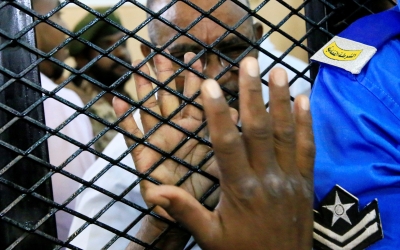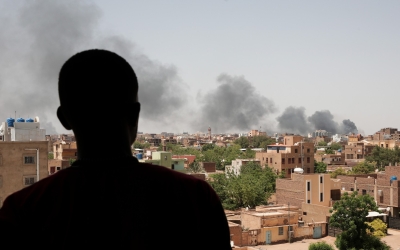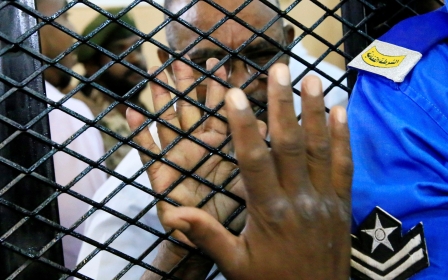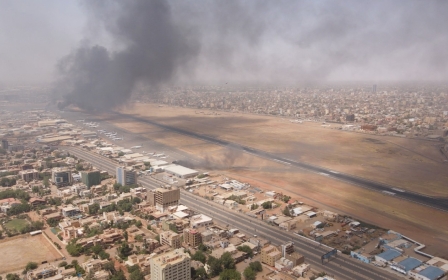Sudan turmoil: Where is Omar al-Bashir?
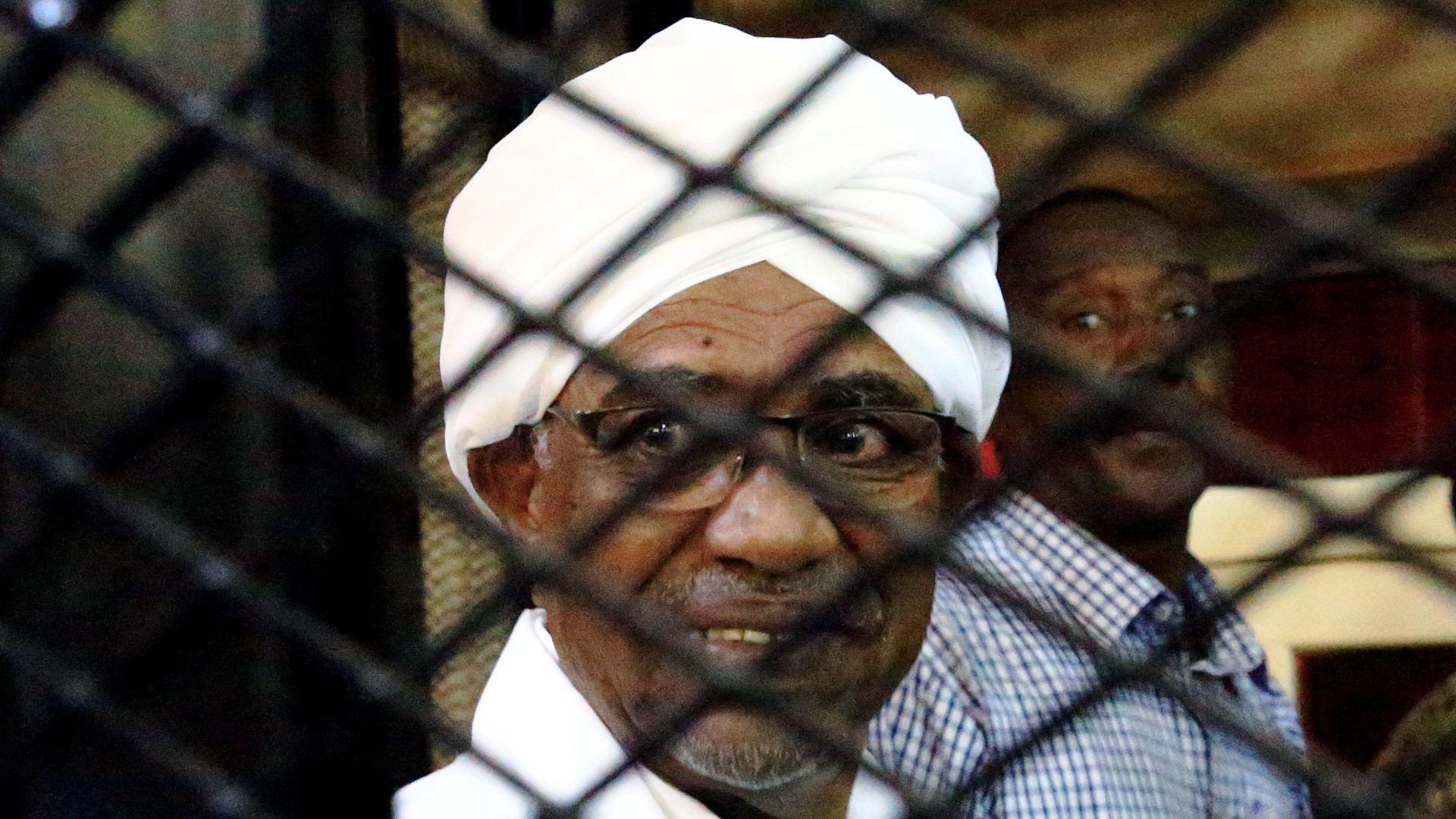
The whereabouts of Sudan's former president Omar al-Bashir are in doubt after thousands of inmates escaped from Kober prison, the high security facility he has been detained in since 2019, over the weekend.
Two inmates told Middle East Eye that they had escaped Kober on Sunday, along with thousands of other fellow prisoners, after fighting intensified around the prison. They were not able to say whether Bashir had also escaped or been moved.
Sudanese local media published a video showing prisoners leaving Kober prison and footage of clashes around it on Sunday. The video showed people in their white prison uniforms walking down an alleyway, carrying their belongings.
Prisoners had set two guard vehicles on fire and protested against the lack of food and water. MEE could not independently verify these reports.
Sources in Sudan and the US told MEE they had heard Bashir had been moved by the Sudanese Armed Forces (SAF) of General Abdel Fattah al-Burhan, but were also unable to confirm this information.
New MEE newsletter: Jerusalem Dispatch
Sign up to get the latest insights and analysis on Israel-Palestine, alongside Turkey Unpacked and other MEE newsletters
An anonymous police source who spoke to Sudans Post, a publication based in South Sudan, said that Bashir and some other members of his administration had been moved out of Kober prison to a safe place, after gunmen thought to be from the Rapid Support Forces (RSF) paramilitary attacked prison guards to free inmates.
“The police have taken necessary measures to secure the safety of former president Omar al-Bashir and members of his regime, who have been moved to a secure location. This move is also aimed at preventing them from fleeing the prison,” the police source said.
Middle East Eye has approached the Sudanese police spokesperson for comment.
Return of the old guard
Bashir, a brigadier general who came to power in an Islamist-backed military coup in 1989, ruled Sudan for 30 years. He was ousted in a popular uprising in April 2019 and faced corruption charges and the death penalty, if convicted, for his part in that coup.
The 79-year old also faces International Criminal Court (ICC) arrest warrants on charges of crimes against humanity, forcible transfer, torture, and rape. A source at the court in the Hague told MEE that while they did not know where Bashir was, the situation in Sudan was "very bad for our case".
MEE also approached the ICC for an official comment.
On Sunday evening, reports and video footage of detainees escaping Kobar prison led to speculation regarding the former autocrat's whereabouts.
Khartoum has been witnessing fierce fighting between the SAF and the RSF since 15 April. Both military entities are led by men who for years served Bashir, only to then help remove him from power in 2019.
Burhan, Sudan's de facto leader and the head of the SAF, was for many years one of Bashir's reliable lieutenants, both literally and politically. His military career under the former president was defined by prominent roles played in South Sudan, Darfur and Yemen where, as head of the armed forces, he helped supply the Saudi-led coalition with Sudanese mercenaries.
Mohamed Hamdan Daglo, the RSF chief better known as Hemeti, was brought into the centre of the Sudanese state by Bashir, who used the former warlord's fighters to brutally quash a rebellion against his rule in Darfur, in the remote west of Sudan.
The RSF, which was established under the control of Bashir's intelligence services in 2013, grew out of the Janjaweed militias accused of systematic killing, torture and rape in Darfur. In 2017, Bashir brought the paramilitary under his direct control, often referring to Hemeti as "my protection".
While both Burhan and Hemeti facilitated the removal of Bashir in 2019, Islamist allies of Bashir have been returning to positions of influence in Sudan since the October 2021 military coup instigated by both generals. Many in Sudan see the release of Bashir as the logical next step in the reassertion of power by the old guard.
Strategic locations
Kober, the area in which the prison is located, is of high strategic importance. It lies close to the affluent neighbourhood of Kafouri in the northeast of Khartoum, where foreign embassies have their offices, and one of the capital's gates, north of the Blue Nile River.
Kafouri is also where Bashir's home, which protesters stormed in April 2019, is located. The last reports of his whereabouts were in February and December when he was taken from prison to the hospital for medical tests.
Bashir, his deputy Bakri Hassan Saleh and Abd al-Rahim Muhammad Hussein, the former defence minister, among other leaders of the former ruling National Congress Party, which was banned in 2019, have spent almost eight months in hospital for "special health treatment" ruled by the court. In November 2022, they were moved to Kober.
The RSF condemned the prison escape. It said in a statement on Twitter that "the coup leaders and the extremists want to turn the wheel of time backwards by restoring the regime of government in the country.
"Today, this plan has become more apparent than ever before, through what was circulated in media about the coup leaders carrying out a forced evacuation of all prisoners in Kober prison, which includes all the leaders of the former regime."
The SAF and RSF have been in active conflict since 15 April, with the army controlling the air and the paramilitary group maintaining a greater street presence. They have been fighting around strategic bridges, airports, military bases and government offices.
More than 400 people have died since the start of the conflict, while thousands of Sudanese have been internally displaced or fled the country.
This article is available in French on Middle East Eye French edition.
Middle East Eye delivers independent and unrivalled coverage and analysis of the Middle East, North Africa and beyond. To learn more about republishing this content and the associated fees, please fill out this form. More about MEE can be found here.


